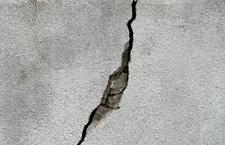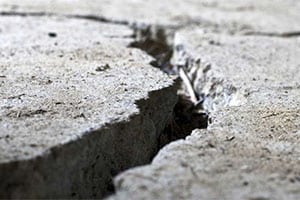 Cracking is the act and result of cracking or splitting . This verb (crack), in turn, has several uses: in this case, we are interested in its allusion to opening and generating cracks (slits).
Cracking is the act and result of cracking or splitting . This verb (crack), in turn, has several uses: in this case, we are interested in its allusion to opening and generating cracks (slits).
An opening or a break is called a crack, therefore. The term is usually used with reference to the crack that appears in a construction , in a container or in another type of structure due to a blow, an earthquake, etc.
For example: “A pineapple fell on the windshield of my car and caused a crack,” “The gas supply had to be interrupted due to a crack in the pipe ,” “The high temperatures generated by the fire caused “cracks in the houses next to the building that caught fire.”
Suppose an earthquake occurs in a certain region. While buildings close to the epicenter collapse due to the movement, others located at a certain distance suffer less serious damage. Thus, in the properties that are part of this second group, cracks of smaller or larger size and depth appear.
Houses often develop cracks over time, and we generally ignore them because we assume that they are superficial issues. However, in some cases these are signs of truly serious problems in the structure, which can lead to unfortunate situations. Although they tend to occur more frequently in older homes, given that their possible causes are several and diverse, they can also be seen in some recently built homes.
Technically speaking, a crack represents the release of tension that occurs between two areas of construction that undergo external movement. The greater the distance between the two parts that open, the more we should worry and the sooner we should act to repair the crack.
Let's now imagine that a casserole slips from a cook's hands and hits a table . By not falling from a great height, the vessel maintains its integrity, but is crossed by a crack . This means that it can leak liquid and that, if it suffers another blow, it is likely to break.
 To repair a crack it is necessary to buy or prepare a suitable product, taking into account different factors. First of all, the material from which the object that has been broken is made. It is also important to know what conditions it is usually subjected to: if it gets wet frequently, then we should use a waterproof product, for example.
To repair a crack it is necessary to buy or prepare a suitable product, taking into account different factors. First of all, the material from which the object that has been broken is made. It is also important to know what conditions it is usually subjected to: if it gets wet frequently, then we should use a waterproof product, for example.
The idea of crack is also used symbolically when something homogeneous cracks . A political analyst, in this framework, can affirm that a decision by the president caused a crack in the government alliance, because it was not well received by many of his allies.
Similarly, a crack in an interpersonal relationship such as a friendship or a relationship can symbolize a very serious problem that threatens to end it forever. Trust, for example, is one of the fundamental pillars of any sentimental bond, it is what allows us to "close our eyes" when we are with the other person because we know that they will take care of us, that they would never intentionally harm us. If the day comes when we no longer feel that security, then we find ourselves facing a crack that will probably never be able to close.
Just as a seismic movement causes damage of different magnitudes, often impossible to repair, if a person betrays the trust that another has placed in them, it is very likely that the relationship cannot be recomposed. To recover it, the effort to be made is enormous, since there may always be the doubt that the event will be repeated.
